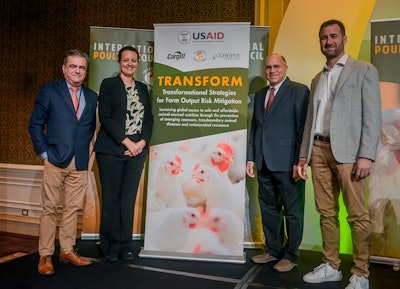
Twenty-six organizations from around the world have announced their support of antimicrobial use stewardship principles that can benefit more than simply poultry flocks. Together, these organizations span over 140 countries and represent over 40% of the global poultry meat industry.
By supporting science-based antimicrobial use principles through TRANSFORM – a United States Agency of International Development (USAID) funded project - these industry-leading organizations are committing to actions at the farm that improve animal health and reduce the need to use antimicrobials, helping to combat the further emergence of antimicrobial resistance (AMR). These actions advance best practices to avoid the need to use antimicrobials and, at the same time, ensure their proper use should they be needed.
AMR – broad impact
At farm level, AMR hinders producers’ ability to prevent and contain disease, increasing production costs, and decreasing farm productivity. More broadly, it affects everything from global health security to global gross domestic production (GDP).
Considering human health, it is estimated that drug-resistant diseases are responsible for at least 700,000 human deaths globally each year.
Where economic development is concerned, the World Bank estimates that AMR-associated loss of gross domestic product (GDP) will be in the range of 1.1-3.8% annually by 2050, which would force an additional 28 million people into poverty.
Importance of livestock
Animal agriculture is an essential component of our global systems. Over 1.3 billion people depend on livestock as their source of income, and the Food and Agriculture Organization (FAO) estimates that livestock contributes 34% of global protein for human nutrition, bringing dietary diversity to 7.8 billion people.
This commitment from the poultry sector to adopt or endorse science-based antimicrobial use stewardship principles is about more than simply animal productivity, it is an important line of defense against some of our biggest global challenges, such as food supply and global health.
TRANSFORM is working at the intersection of animal agriculture and human health to mitigate some of our most pressing global health security threats, including AMR. Driven by a private sector-led consortium that includes Cargill, the International Poultry Council (IPC), and Heifer International, a development organization, TRANSFORM is taking a holistic approach to improving animal health by focusing on the market systems surrounding farmers to drive sustainable change.
The poultry industry is being recognized as a leader in antimicrobial use stewardship, demonstrating a path forward to improving animal health. By universally rethinking antimicrobial use and working together, a sustainable change in the industry and beyond can be achieved.










